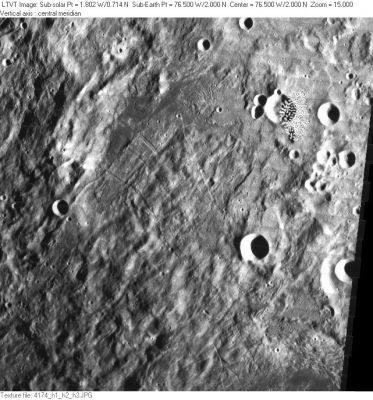Hedin
Contents
Hedin
|
Lat: 2.0°N, Long: 76.5°W, Diam: 150 km, Depth: 1.25 km, Rükl: 28 |
LO-IV-174H Hedin is the shallow depression filling most of this frame. The southeastern part of Hedin's rim shows the location of the bowl shaped high-albedo crater Riccioli H. The northwestern part of Hedin's floor shows a lacus-like low-albedo region, see LPOD Fictitious Moon (Hedin is detectable slightly rightward of the lunar orb's "centre").
Images
LPOD Photo Gallery Lunar Orbiter Images
Maps
(LAC zone 55C4) USGS Digital Atlas PDF
Description
Description: Wikipedia
Additional Information
- Depth data from Kurt Fisher database
- Westfall, 2000: 1.25 km
- Cherrington, 1969: 1.98 km
- High albedo crater Riccioli H on the southeastern part of Hedin's rim.
- Hedin is a good guide for those who want to try to observe the high-albedo ray system of farside crater Pierazzo during favorable libration (the location of Pierazzo is west of Hedin). - DannyCaes Aug 17, 2015
Nomenclature
- Named for Sven Anders Hedin (February 19, 1865 - November 26, 1952), a Swedish explorer, geographer and geopolitician. His achievements include the production of the first detailed maps of vast parts of Pamir, the Taklamakan Desert, Tibet, the ancient Silk Road, and the Himalayas. He seems to be the first to realise that the Himalayas are a single mountain range. Primarily an explorer, Hedin was also the first to unearth the ruins of ancient Buddhist cities in Chinese Central Asia.
- According to the report in IAU Transactions XIIB, the name Hedin in the Rectified Lunar Atlas was approved to replace Fauth's previously unnamed (by the IAU) Sven Hedin. Whitaker, on page 227 of his book, says Fauth's name designated the same feature, but on page 235 he says it was a different crater. NASA SP-241 says Hedin is a replacement for the IAU's former Olbers C.
- Olbers C was a name attributed to Mädler and adopted as Catalog Number 1931 in Named Lunar Formations. It was a little smaller than Hedin and in the vicinity of the modern Hedin F and G (possibly the Olbers U and F of NLF). - Jim Mosher
- In the early 19th century, Gruithuisen had apparently used the name Herschel for the present feature (Whitaker, p. 112).
- The IAU briefly considered deleting the nearside name Hedin and reassigning it to a farside crater. That decision was rescinded, but not before some preliminary maps with the incorrect nomenclature had been printed (Menzel, 1971).
- Sven Hedin E (or F?) was called Baum by Wilkins and Moore, but the I.A.U. did not accept that name. Richard Baum is a contemporary English selenographer.
- Rimae Hedin (a certain lunar investigator's unofficial name for the system of rilles on the floor of Hedin).
LPOD Articles
Bibliography
Richard M. Baum (the IAU's Hedin E or F) in the Sourcebook Project (compiled by William R. Corliss)
- In: Mysterious Universe, a handbook of astronomical anomalies (1979) :
- On the observed appearance of a remarkable light spot on the night side of Venus (Strolling Astronomer, 1956)
- The Maedler Phenomenon (Strolling Astronomer, 1978) (probably the same as M.G.J.Minnaert's Blue Arcs optical phenomenon)
- On the observations of the reported Dusky Ring outside the Bright Rings of the planet Saturn (Journal of the British Astronomical Association, 1954)
